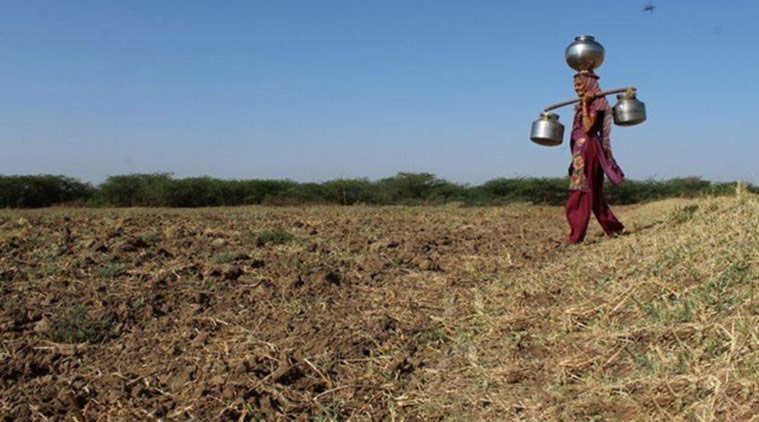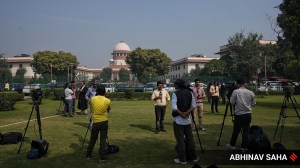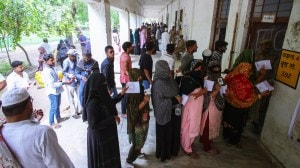- India
- International
Jal Jeevan Mission shows that Modi govt is committed to unburdening lives of women
With women playing a leadership role in managing their community’s water resources, minus the drudgery of walking for miles to fetch water for their families, the Jal Jeevan Mission will provide a massive fillip to the ease of living for women, and they will no longer be beasts of burden.
 Our mothers and sisters have silently catered to every water need of their families, Smriti Irani wrote.
Our mothers and sisters have silently catered to every water need of their families, Smriti Irani wrote.
For centuries, in most parts of the country, especially in rural areas, our women have borne the responsibility (or should I say the burden) of ensuring the water security of their homes. Our mothers and sisters have silently catered to every water need of their families. In some instances, this would involve walking long distances in unfriendly weather and treacherous terrain — in the blistering heat of Rajasthan to the majestic hills of Uttarakhand to the parched lands of eastern Maharashtra.
These unsung heroes, however, have witnessed an exponential increase in their water woes in the past few decades. For a country with 16 per cent of the world’s population, and only 4 per cent of the world’s freshwater resources, with the changing weather patterns and frequent droughts, over 250 of the 700 districts of India’s districts are now water stressed. Two hundred and fifty six of our approximately 700 districts have groundwater levels which are “critical” or “over-exploited” as per the latest data from the Central Ground Water Board (2017). To put it simply, this means that fetching water in these districts is now that much harder, as the water table has fallen that much deeper. According to a report by the National Commission for Women, on an average, a rural woman in Rajasthan walks over 2.5 km to reach a water source. This is probably an underestimate, but the bottomline is that our women and girls spend a significant proportion of their time on fetching water.
But things are changing. In 2014, India witnessed history in the making as the nation saw an incredible shift in the national development agenda. This shift in policy focus was to reduce the drudgery faced specially by women and girls, and improve their quality of life by providing them services targeted for their convenience. The first major step in this direction was when Prime Minister Narendra Modi drew the attention of 1.25 billion Indians from the ramparts of the Red Fort and addressed the need to end the practice of open defecation — and restore the dignity of our women and their basic health. Over the next five years, the Swachh Bharat revolution has transformed lives across the country by ensuring access to safe sanitation for over 10 crore households. In 2017, a study by the Bill and Melinda Gates Foundation had estimated that there were fewer women with lower than normal body mass index in open defecation free (ODF) villages in India as compared to other villages where people defecated in the open. By October 2019, all villages in India had declared themselves ODF. Just recently, another study by scholars from the Ashoka University and the University of Virginia, has found that the increased in-home toilet access in India has significantly reduced sexual assaults on women.
Opinion | Mihir Shah writes: India’s water problem has a simple solution
And then there were many subsequent programmes of our government focused on reducing drudgery for women, improving their health and giving them the respect they deserve. These programmes have also empowered women to lead the change. The Ujjwala scheme provided LPG cylinders to crores of rural women, saving them from the toxic fumes that they breathed on a daily basis when they burnt firewood for their chulhas. The POSHAN abhiyan supports the health of children, adolescent girls and women, to reduce cases of low birth weight, stunting, under-nutrition, and anaemia. The Swachh Bharat Mission has created a cadre of head women masons, better known as “Rani Mistris”, who have breached a traditional male bastion and have already constructed lakhs of toilets across the country.

By announcing the Jal Jeevan Mission (JJM) from the Red Fort during his first Independence Day speech of his second term, the prime minister has once again shown that his government is committed to un-burdening the lives of our mothers and sisters, and providing them the opportunity to use their time more productively and improve their quality of life. The Mission aims at providing Har Ghar Jal or piped water supply to all households by 2024. While 57 per cent of the country is covered with public stand posts for their daily water supply, the JJM will connect individual households to appropriate and adequate water supply. Currently, only 18 per cent of rural households have this amenity.
At the recent launch of the Jal Jeevan Mission operational guidelines, the prime minister listed out the government’s step-by-step approach to tackle this problem whose time had come. One, the new Ministry of Jal Shakti breaks the silos in which the water sector had been working in, allowing for institutional integration from the centre till the grass roots. Two, schemes are being designed with local flexibility to allow for effective adaptivity to local situations. Three, source sustainability is being mandatorily built into schemes to ensure that every drop of water is recycled and reused. And four, these efforts must take form of a jan andolan for water to ensure the overall water security of our great nation.
Opinion | Parameswaran Iyer writes: A jan andolan for water
Another scheme to conserve groundwater in regions with low water tables, the Atal Jal Yojana, was also recently launched by the Prime Minister in New Delhi. Also based on community participation, a key component of this programme is the formation of water use associations, in which at least 50 per cent of members are to be women.
With women playing a leadership role in managing their community’s water resources, minus the drudgery of walking for miles to fetch water for their families, the Jal Jeevan Mission will provide a massive fillip to the ease of living for women, and they will no longer be beasts of burden. The signs are all there and the winds of change are in tandem with the mood of the nation. For real change, it is optimal that we ensure that the real heads of the households — our mothers and sisters — continue to be at the centre of our country’s development agenda.
This article first appeared in the print edition on January 27, 2020 under the title “The respect she deserves”. The writer is Union Minister of Women and Child Development
EXPRESS OPINION
More Explained
Apr 26: Latest News
- 01
- 02
- 03
- 04
- 05











































